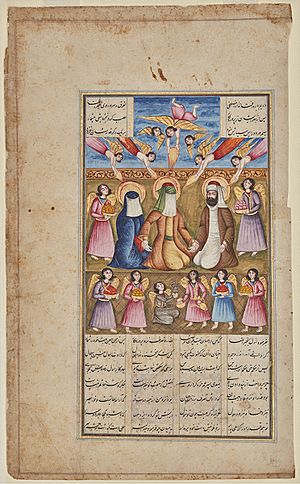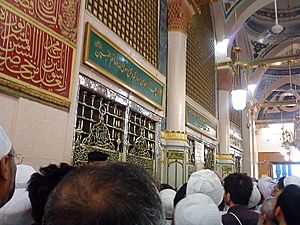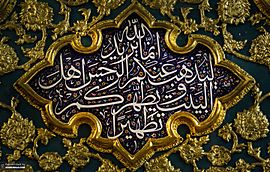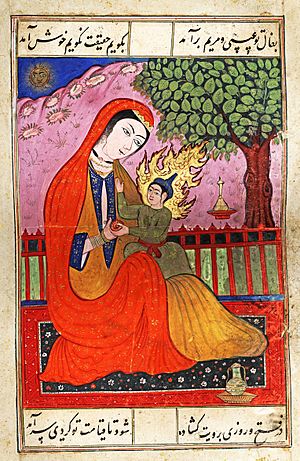Fatima facts for kids
Quick facts for kids
Fatima
al-Zahra
|
|
|---|---|
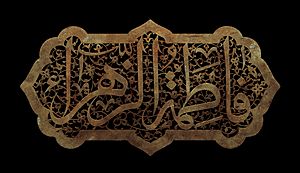
Artwork with Fatima's name, reconstruction from a Safavid piece
|
|
| Born | 605 or 612/15 (disputed) |
| Died | 632 |
| Resting place | Medina, Hejaz |
| Title |
List of titles
al-Zahra (lit. the radiant) al-Siddiqa (lit. the righteous) al-Muhadditha (lit. the one spoken to by angels) Umm Abiha (lit. mother of her father) Sayyidat Nisa al-Janna (lit. mistress of the women of paradise) Sayyidat Nisa al-Alamin (lit. mistress of the women of the worlds) |
| Spouse(s) | Ali |
| Children | |
| Parent(s) | |
Fāṭima bint Muḥammad (Arabic: فَاطِمَة ٱبْنَت مُحَمَّد, 605/15–632 CE), also known as Fāṭima al-Zahrāʾ (فَاطِمَة ٱلزَّهْرَاء), was a very important woman in early Islamic history. She was the daughter of the Islamic prophet Muhammad and his first wife Khadija.
Fatima was married to Ali, who was Muhammad's cousin. Ali later became the fourth leader (Caliph) of the Muslim community. Fatima and Ali had two sons, Hasan and Husayn, who are highly respected figures in Islam.
Many Muslims see Fatima as a perfect example of a Muslim woman. She is known for her kindness, generosity, and strength in difficult times. Muhammad loved her very much and said she was the best of women. Today, many Muslim girls are named Fatima.
After Muhammad passed away in 632 CE, there was a disagreement about who should lead the Muslim community. Fatima and Ali believed that Ali should be the next leader. However, Abu Bakr became the first Caliph.
Fatima passed away within six months of her father. Her death is a sad and debated topic. Some believe she died from sorrow. Others believe her death was caused by injuries she received during an event where people tried to make Ali pledge loyalty to Abu Bakr. She was buried secretly at night, and her exact burial place is still unknown.
Contents
Fatima's Names and Titles
Fatima had many special names and titles that showed her importance.
What Does Fatima Mean?
The name Fatima comes from an Arabic word meaning "to wean." Some believe it means that she, her children, and her followers are protected from hellfire. Others connect her name to God's creative power.
Special Titles for Fatima
Her most common title is al-Zahra, which means "the radiant" or "the shining one." This name shows her deep faith and how often she prayed. Some believe her light shone for people in the heavens when she prayed.
Other titles include:
- al-Siddiqa (the righteous)
- al-Tahira (the pure)
- al-Mubaraka (the blessed)
- al-Mansura (helped by God)
- al-Muhadditha (the one spoken to by angels), like Mary, the mother of Jesus.
She is also called Sayyidat Nisa' al-Janna (mistress of the women of paradise) and Sayyidat Nisa' al-Alamin (mistress of the women of the worlds). These titles show her high status among all women.
Honorific Titles (Kunyas)
A special honorific title for Fatima is Umm Abiha, meaning "the mother of her father." This shows how much she cared for and supported her father, Prophet Muhammad. Another title is Umm al-Aima, meaning "the mother of Imams," because all the Twelve Imams (important leaders in Shia Islam) are her descendants.
Fatima's Early Life
Fatima was born in Mecca. Her mother was Khadija, Prophet Muhammad's first wife. Most historians believe Fatima was born around 605 CE. Other sources say she was born later, around 612 or 615 CE.
Fatima grew up during a difficult time for Muslims in Mecca. Prophet Muhammad and his followers faced harsh treatment from those who did not believe in Islam. Fatima often helped her father. Once, when someone threw dirt on Muhammad, young Fatima rushed to clean him.
She lost her mother, Khadija, when she was a child. This was a very sad time for her. It is said that the angel Gabriel brought a message to Muhammad to comfort Fatima after her mother's death. Many believe Fatima was Muhammad's only biological daughter who survived him.
Fatima's Marriage
Fatima married Muhammad's cousin, Ali, in Medina around 623-625 CE. Before Ali, some other important companions of Muhammad had asked to marry Fatima, but Muhammad said he was waiting for God's will.
Ali was a humble man and was hesitant to ask for Fatima's hand because he was poor. When Muhammad asked Fatima if she agreed to marry Ali, she remained silent. This silence was taken as her agreement, showing that a woman's consent is important in Islamic marriage.
Muhammad suggested that Ali sell his shield to pay for the bridal gift (called a mahr). The wedding celebration was simple, with gifts from other Muslims. Fatima even gave away her wedding dress on her wedding night. The couple moved into a house next to Muhammad's home in Medina. Their marriage lasted about ten years until Fatima's death.
In their early years, Fatima and Ali lived in poverty. They both worked very hard. Ali took on various jobs, and Fatima managed the household chores. It is said that Muhammad taught them a special prayer (called a tasbih) to help them with their difficulties. This prayer, known as the Tasbih of Fatima, includes phrases like "God is the greatest," "all praise is due to God," and "God is glorious." Their financial situation improved later. Fatima eventually had a maidservant named Fidda.
Fatima was a strong and supportive daughter. After the Battle of Uhud, she cared for her father's wounds. She also visited the graves of those who died in the battle to pray for them. Fatima also joined Muhammad during the Conquest of Mecca.
Why Their Marriage Was Important
Many Muslims believe that God ordered Muhammad to marry Fatima to Ali. Muhammad also told Fatima that he had married her to the best person in his family. This marriage is seen as a very special spiritual union between two of the most important figures around Muhammad.
Ali did not marry anyone else while Fatima was alive. Their marriage was a happy one, and Ali is reported to have said, "Whenever I looked at her [Fatima], all my worries and sadness disappeared."
Fatima's Appearance
Some descriptions say Fatima was very beautiful, comparing her to the full moon or the sun. Others say her beauty was more about her inner purity and spiritual light. It is widely agreed that Fatima's manners and way of walking were very similar to her father, Prophet Muhammad.
Events After Muhammad's Death
Fatima was deeply saddened after her father, Prophet Muhammad, passed away in 632 CE. She wrote poems expressing her grief. During this time, she also strongly believed that her husband, Ali, should be the rightful leader after Muhammad.
The Inheritance Dispute
Fadak was a village with agricultural land. Half of it belonged to Prophet Muhammad. Some sources say Muhammad gave his share of Fadak to Fatima as a gift. Its income helped travelers, the poor, and Muhammad's family.
After Muhammad's death, Abu Bakr, who became the first Caliph, took control of Fadak. Fatima believed it was her right and that it was a gift from her father. Her husband Ali and others supported her claim. However, Abu Bakr did not accept their testimonies.
Abu Bakr claimed that prophets do not leave behind an inheritance for their families. He said that whatever they leave becomes public property. This statement, known as the hadith of Muhammad's inheritance, was initially only heard from Abu Bakr. Fatima strongly disagreed, saying that this contradicted the Quran, which shows prophets inheriting from each other.
In protest, Fatima gave a powerful speech at the Prophet's Mosque, known as the Sermon of Fadak. In this speech, she defended Ali's right to lead and criticized Abu Bakr for denying her inheritance. She quoted verses from the Quran to support her claims about inheritance.
Many believe that Abu Bakr's actions regarding Fadak were a political move. It might have been to reduce the influence of Muhammad's family and weaken Ali's claim to leadership.
The Attack on Fatima's House
After Muhammad's death, some Muslims gathered to choose a new leader. This meeting happened while Muhammad's family was preparing for his burial. Abu Bakr was chosen as the new leader.
However, Muhammad's family and some companions, including Ali and Fatima, did not agree with this decision. They gathered at Fatima's house to show their support for Ali, believing he was the rightful successor.
Abu Bakr reportedly sent his ally Umar to Ali's house to demand Ali's pledge of loyalty. Umar led a group of armed men and threatened to burn down the house if Ali and his supporters did not agree. The situation became tense. Fatima bravely pleaded with the group, and they eventually left without Ali's pledge.
Some historical accounts say Ali pledged loyalty to Abu Bakr immediately after this threat. Other accounts, especially in important Sunni collections, state that Ali pledged loyalty only after Fatima passed away.
It is believed that Abu Bakr then boycotted Ali and Muhammad's family. This meant that many important people stopped talking to Ali. It seems that only Fatima and their four young children remained by Ali's side during this difficult time.
Fatima's Passing Away
Fatima passed away in 632 CE, within six months of her father's death. She was either 18 or 27 years old at the time, depending on the historical source. The exact date of her death is not certain.
Many Sunni Muslims believe Fatima died from deep grief after her father's passing. However, in Shia Islam, it is believed that Fatima's death was a direct result of injuries she received during the events at her house. These injuries are also said to have caused a miscarriage of her third son, Muhsin.
Fatima suffered greatly in her final days. Accounts describe her becoming very ill and weak. She never fully reconciled with Abu Bakr and Umar. Some reports say they visited her on her deathbed to apologize. Fatima reminded them of Muhammad's words: "Fatima is part of me, and whoever angers her, angers me." She then told them that they had indeed angered her and that she would complain to God and His prophet.
Fatima's Burial
Following her wishes, Ali buried Fatima secretly at night. Her exact burial place was kept hidden. This was because Fatima did not want Abu Bakr to attend her funeral. This wish was unusual for Muslims, who are encouraged to join funerals. For Shia Muslims, her secret burial shows her deep displeasure with the Muslim community who did not support her.
Her burial was a very sad moment for Ali. The next morning, Abu Bakr and Umar reportedly questioned Ali about the secret burial. When they learned it was Fatima's wish, Umar is said to have threatened to dig up her body. Ali, however, warned him strongly, saying he would not allow it. This shows how protective Ali was of Fatima, especially after her suffering.
Fatima's exact burial place in Medina is still unknown. The two most likely places are the al-Baqi' cemetery or her own home, which was later made part of the Prophet's Mosque.
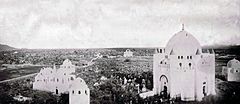
Fatima's Descendants
Fatima had two sons, Hasan and Husayn, and two daughters, Zaynab and Umm Kulthum. There is a difference of opinion about her third son, Muhsin. Some Shia sources say he died in a miscarriage due to the events at her house. Sunni sources say he died in infancy from natural causes.
It is through Fatima that Prophet Muhammad's family line has continued to this day. Her descendants are given special titles like sayyid (lord or sir) or sharif (noble) and are highly respected by Muslims around the world.
Fatima in the Quran and Hadith
While Fatima is not mentioned by name in the Quran, some verses are believed to be about her and her family.
The Verse of Mubahala
This verse (Quran 3:61) is about a challenge between Prophet Muhammad and a Christian group. Muhammad brought his closest family members for this important event. Many believe that "our sons" refers to Hasan and Husayn, "our women" refers to Fatima, and "ourselves" refers to Ali. This shows the high spiritual status of Fatima and her family.
These five people—Muhammad, Ali, Fatima, Hasan, and Husayn—are known as the Ahl al-Kisa (people of the cloak) because they gathered under Muhammad's cloak during this event. Muhammad also called them the Ahl al-Bayt (people of the house).
The Verse of Purification
This verse (Quran 33:33) talks about God wanting to purify the Ahl al-Bayt completely. Muslims have different ideas about who exactly belongs to the Ahl al-Bayt. Shia Muslims believe it refers only to the Ahl al-Kisa: Muhammad, Ali, Fatima, Hasan, and Husayn. This verse is seen as proof of their purity and freedom from sin.
Some Sunni scholars also agree that the Ahl al-Bayt in this verse refers to these five individuals. It is said that Muhammad would pass by Fatima's house every morning and recite this verse to remind her family to pray.
The Verse of Mawadda
This verse (Quran 42:23) asks Muslims to love Muhammad's "kinsfolk." Shia Muslims believe this refers to the Ahl al-Bayt: Fatima, Ali, Hasan, and Husayn. They believe that loving them also means obeying them as guides. Some Sunni scholars also agree with this interpretation.
Verses About Generosity
Some verses (Quran 76:5-22) are connected to Fatima and her family. These verses are believed to have been revealed after Fatima, Ali, Hasan, Husayn, and their maidservant Fidda gave away their only meal for three days in a row to beggars who came to their door. This shows their incredible generosity.
Fatima Compared to Mary
Fatima is often compared to Mary, the mother of Jesus, especially in Shia Islam. Both are seen as highly pure and favored by God. Angels are said to have spoken to both of them. Mary gave birth to Jesus, and Fatima is the mother of the Imams. Some sources even call Fatima "Maryam al-Kubra" (Mary, the greater).
Important Sayings (Hadith) About Fatima
Many sayings of Prophet Muhammad highlight Fatima's importance:
- "Fatima is a part of me, and whoever makes her angry, makes me angry." This shows how deeply connected Muhammad was to his daughter.
- "Whoever loves (my) offspring, God loves; whoever gets angry [at them], God gets angry at them."
- "Verily God becomes angry when Fatima is angry and is pleased when she is pleased."
Muhammad also said that Fatima is the mistress of all women on Earth and in paradise. He always stood up to greet her and asked her to sit next to him. When he left Medina, Fatima was the last person he said goodbye to, and she was the first he visited upon his return.
It is also said that Fatima will be the first person to enter paradise and will be able to help those who honor her and her descendants.
Fatima in Modern Culture
Fatima is still a very important figure today. She is seen as a role model for Muslim women, representing strength, compassion, and standing up for what is right.
Mother's Day in Iran
In Iran, Fatima's birthday (on 20 Jumada al-Thani in the Islamic calendar) is celebrated as Mother's Day. On this day, banners with "Ya Fatima" (O! Fatima) are displayed on buildings and streets. The date changes each year on the Gregorian calendar.
| Year | 2018 | 2019 | 2020 | 2021 | 2022 | 2023 | 2024 |
|---|---|---|---|---|---|---|---|
| Gregorian date | 9 March | 26 February | 15 February | 3 February | 24 January | 14 January | 3 January 22 December |
Images for kids
See also
 In Spanish: Fátima az-Zahra para niños
In Spanish: Fátima az-Zahra para niños
- Book of Fatimah
- Hamsa, a type of amulet also referred to as the "Hand of Fatima"
- Our Lady of Fátima, the title of the Virgin Mary based on reported apparitions at Fátima, Portugal
- Bayt al-Ahzan


